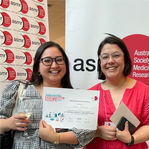Welcome
Salut
Bonjour
Olá
Konnichiwa
G'Day

About Us

At the Tran Lab, we study how non-coding RNAs (ncRNAs) influence cancer, with a focus on Head and Neck Cancers (HNC). Our research explores the roles of small RNAs, long non-coding RNAs (lncRNAs), and other regulatory molecules in tumour growth, immune response, and treatment resistance.
A key area of our work is developing RNA-based diagnostics for early oral cancer detection. We are designing less-invasive biomarker tests using saliva and blood to improve early detection and guide personalised treatment strategies, ensuring patients receive the most appropriate therapies.
In addition, we study HPV16’s role in cancer, investigating how it interacts with host RNA networks to drive disease progression. More recently, our research has expanded into cross-kingdom RNA regulation, exploring how RNAs from viruses and larger parasites influence human health.
If you’re passionate about RNA biology and its potential to transform research, we’d love to collaborate, our lab welcomes all new ideas and partnerships!
All in enquiries: nham.tran@uts.edu.au
Lab News
We have lab members working on various aspects of RNA biology in diseases. Between running gels, performing PCRs and growing cells, we find the time to have fun and enjoy our science!
Passe and Williams Grant
In 2025, we were awarded a Passe and Williams Grant in collaboration with A/Prof Michael Elliott (Chris O’Brien Lifehouse).
This award marks a decade-long partnership between our teams, and on behalf of both Michael and myself, we sincerely thank the foundation for their generous support of our research.
Many individuals played a crucial role in helping us secure this grant, including our former students Sue Succhy, Fiona, and Jess, as well as postdoctoral researcher, Dayna.
This funding will enable us to develop a salivary assay for the detection and stratification of HPV-positive oropharyngeal cancer (OPC) patients, advancing diagnostic capabilities and improving patient outcomes.

Emily Chatterton
Emily is a final year biomedical engineering student currently working on her capstone which involves optimising the PocketPCR to improve diagnostic outcomes for remote Australian communities.
Emily has experience working in a public hospital as a biomedical engineering intern. She also plays in UTS’s mixed netball social competition and enjoys going out to yum cha.
Maddy is a final year Biomedical Engineering student at UTS, with a passion for leveraging engineering technologies to help improve the lives of the wider community. The project Maddy is working is the optimising the PocketPCR, a thermocycler used to activate biological reactions, in order to deliver quicker and more effective diagnosis to remote Indigenous communities within Australia
Madeline Jelbart
Current and Previous funding agencies which have supported our work

ARC Discovery Projects - (DP210101337)

UTS Chancellors Fellowship Program

Funder: Congressionally Directed Medical Research Programs (CDMRP). Award Number: W81XWH-11-1-0400 - Proposal Number: PC100037

Various Seed and PhD grant funding

1.Research Scholarship Funding 2023-25
2. ConJoint Grant 2025-27
Selected Lab Publications

1. Bustin SA, Ruijter JM, van den Hoff MJB, Kubista M, Pfaffl MW, Shipley GL, Tran N, Rodiger S, Untergasser A, Mueller R et al: MIQE 2.0: Revision of the Minimum Information for Publication of Quantitative Real-Time PCR Experiments Guidelines. Clin Chem 2025.
2. Hill M, Stapleton S, Nguyen PT, Sais D, Deutsch F, Gay VC, Marsh DJ, Tran N: The potential regulation of the miR-17-92a cluster by miR-21. Int J Biochem Cell Biol 2025, 178:106705.
3. Sais D, Chowdhury S, Dalton JP, Tran N, Donnelly S: Both host and parasite non-coding RNAs co-ordinate the regulation of macrophage gene expression to reduce pro-inflammatory immune responses and promote tissue repair pathways during infection with fasciola hepatica. RNA Biol 2024, 21(1):62-77.
4. Chowdhury S, Sais D, Donnelly S, Tran N: The knowns and unknowns of helminth-host miRNA cross-kingdom communication. Trends Parasitol 2024, 40(2):176-191.
5. Deutsch F, Pham D, Hien ND, Nguyen T, Tran N, Sais D, Tran N: Trends in Head and Neck Cancer incidence in Ho Chi Minh City, Vietnam between 1995-2015. 2023.
6. Deutsch F, Sais D, Hill M, Tran NH, Elliott M, Tran N: A Liquid Biopsy To Detect Transcriptionally Active Human Papillomavirus 16 From Patient Saliva. 2023.



Quantitative PCR Workshop - 4 Day Course
In 2023, our workshop welcomed both beginners and post-doctoral researchers eager to deepen their qPCR knowledge. The curriculum encompassed experimental design, control measures, and data interpretation techniques.
Participants particularly appreciated the hands-on training provided in our PC2 laboratories. With 30 attendees, the workshop was a success, and all had an enjoyable experience. We look forward to offering this course again in 2025.
If you are interested in the 2025 workshop, please contact Nham, email: nham.tran@uts.edu.au for a reservation.


























.png)


